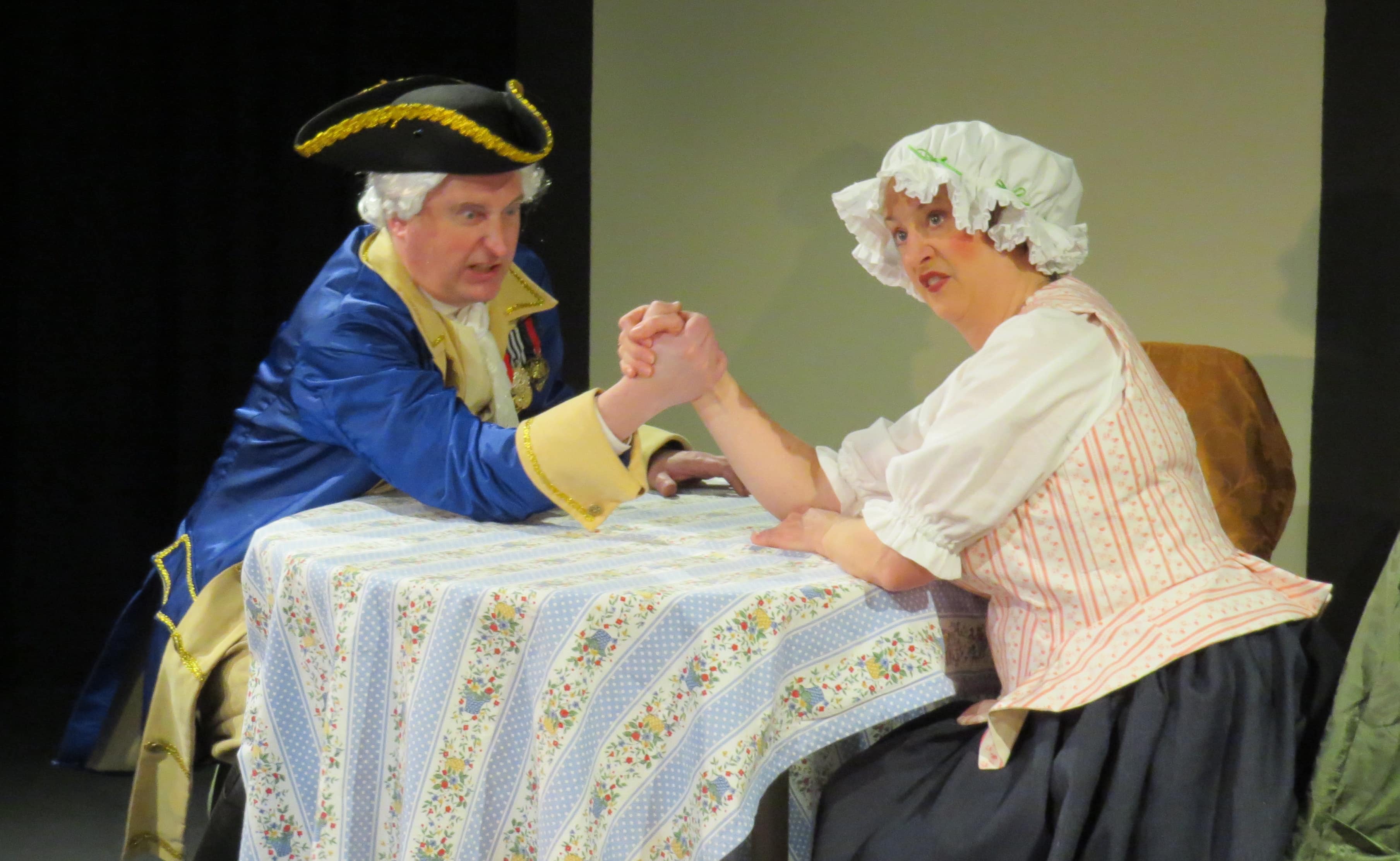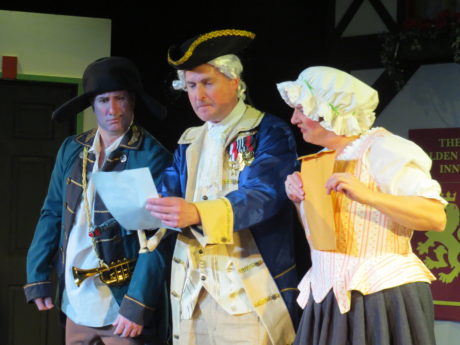One of the things Best Medicine Rep does best is comedies about historical and literary figures, such as last year’s Engaging Shaw. They are now presenting another, Philosophus, by Colin Speer Crowley, “a farce that is both historical and hysterical.” Although both plays are historically based, whereas the emphasis in Shaw was on wit and character, the keyword in Philosophus, in keeping with the more bawdy nature of the 18th century, is definitely farce.

One of the remarkable things about Crowley’s play is how much of the farce is true. In 1753, Voltaire was journeying back to France (if he was fleeing persecution, it was a very slow flight) from the court of his former patron Frederick the Great of Prussia. He arrived in Frankfurt and was detained by Frederick’s agents, who were under orders to retrieve a document the king had given to Voltaire. His niece Marie arrived and was held with him, and had to fend off the unwanted advances of a guard. She and Voltaire were finally released after his luggage was ransacked and the offending item found.
In Philosophus this incident provides the fodder for High Farce. It supplies stock characters as old as the Commedia dell’Arte or even the Roman comic Plautus: the Cunning Thinker, the Stupid Servant, the Pompous Officer, the Lusty Soldier, the Buxom Maid, and the Greedy Harridan. These are all set upon each other in the broadest kind of comedy. It has chase scenes, mistaken identities, lost luggage, an overbearing old woman, an ogle-worthy young one, and duels with both wits and pistols. For those familiar with British comedy, it resembles Benny Hill meets the Enlightenment, or Carry On Philosopher.
Voltaire becomes a self-satisfied philosopher who spouts brave words about defending the liberty of mankind but is more interested in defending his own. Terence Aselford (who appears courtesy of Actors’ Equity) does a fine job of breathing life into Voltaire’s pompous speeches, especially since the script has him saying essentially the same “Defense of liberty! Death to tyranny!” diatribe over and over again.
He is accompanied by the archetypal idiot valet, in this case played as a heavily-accented Italian by Terence Heffernan. If the accent and lack of brains were the only jokes, the character would soon pall, but Heffernan imbues it with a sweet exasperation which wins the audience’s sympathy. He similarly redeems his other character, a dim-witted soldier who spends most of his time staring down the bodice of the young lady.
The pompous officer, Baron von Freytag, well played with a clipped German accent and Prussian prudishness by John Morogiello, is a suitable foil for Voltaire. While playing the Baron with a straight face, he catches every opportunity for comic bits, such as miming stroking a cat like a James Bond villain, to great effect.
Khaleshia Thorpe-Price brings dignity to the buxom maid, Mademoiselle Denis. While her character seems to be a walking nudge-nudge wink-wink joke (Voltaire’s niece, ha ha ha!), truth is stranger than fiction because Voltaire actually did have an affair with his own niece. Thorpe-Price does as well as she can with lines like “he makes my bosom perky with pride” and “I am not wearing any underwear.” Yes, the 18th Century was much more open about sexuality than the Victorian era, and yes, it is good to have a female character who proudly owns her sexual agency. But it would be nice if Mademoiselle Denis had something more to do than helping Voltaire escape by offering herself to every guard between him and the town gate.
Frau Schmidt, the harridan, rounds out the cast of clowns. As portrayed by Rebecca A. Herron, she is shrewd, crafty, greedy, violent and very, very funny, with a wide repertoire of goofy facial expressions, a German accent you could cut with a knife, and plenty of actual knives and other instruments of torture. She is as formidable (not to say repulsive) as Mlle. Denis is alluring.

In a play about one of the greatest wits in history, it is slightly disappointing to see Voltaire and those around him reduced to a collection of stock tropes, however well-played. In between the chases and the bosom jokes, the best scene in the show is the one where Voltaire actually gets to display the brain power that made him legendary, when he essentially confuses his guard into submission. It bears a happy resemblance to an extended version of the Poisoned Chalice scene in The Princess Bride.
Director Stan Levin keeps the farcical action going at a cracking pace, evoking performances that are simultaneously ridiculous and endearing. He is helped by the quality and charisma of his actors.
The set for Philosophus (by John Morogiello) is extremely basic — just two doors, two windows with window boxes, and some fake half-timbering on the walls. When the play supposedly switches to an interior scene, it is represented by a folding Formica kitchen table covered with a floral bedsheet, which is inexplicably set up in full view of the audience at the beginning of Act II, rather than during intermission. This is hardly a representation of the opulence of the Baroque. The costumes (by Elizabeth Kemmerer) at least nod at being in period. One can only hope that Best Medicine Rep will become successful enough that they can raise their production values to match the quality of the performers.
Philosophus is a rib-tickling farce. Given the subject matter and the quality of this company’s actors and other productions, it would be perfect if it were a bit more mind-tickling as well. But this is a quibble. Overall, it is a very entertaining evening at the theater.
Philosophus plays through February 24, 2019, Fridays and Saturdays at 7 pm, and Saturday and Sunday matinees at 2:30 pm, at Best Medicine Rep Theater at Lakeforest Mall, 701 Russell Avenue, Gaithersburg, MD 20877. Purchase tickets at the door, or go online.




